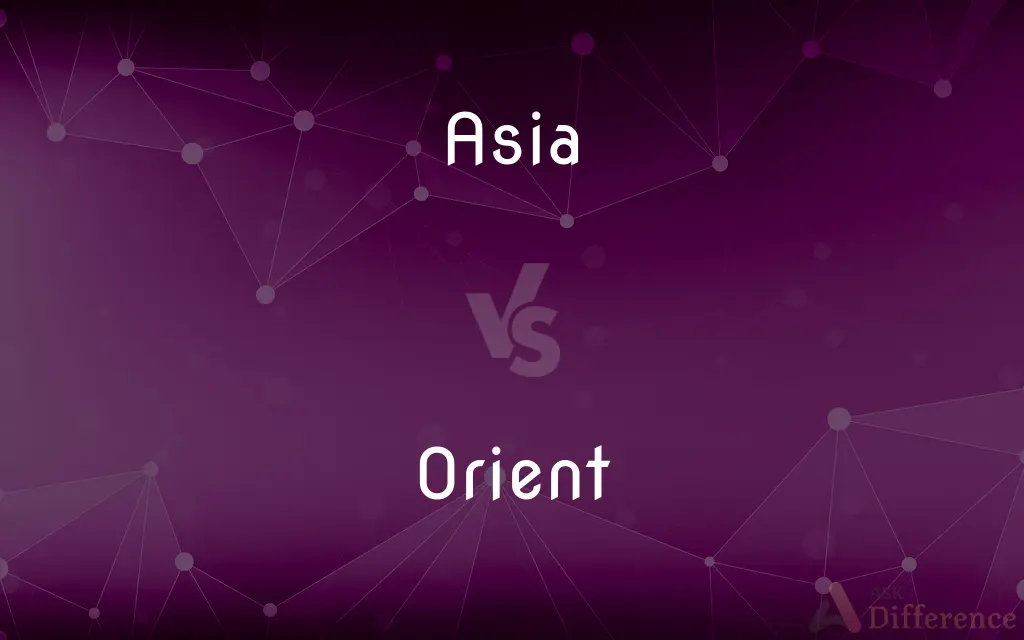Asia vs. Orient — What's the Difference?
By Tayyaba Rehman & Urooj Arif — Updated on May 2, 2024
Asia is the largest continent on Earth, rich in diversity and modern relevance, while "Orient" is an outdated term often referring to Eastern Asia with historical and exotic implications.

Difference Between Asia and Orient
Table of Contents
ADVERTISEMENT
Key Differences
Asia encompasses a vast geographical area from Turkey in the west to Japan in the east, encompassing diverse cultures, languages, and ecosystems. On the other hand, the Orient traditionally refers to countries of East and Southeast Asia, emphasizing regions like China, Japan, and Korea.
Asia is recognized in contemporary discussions for its significant role in global economics, politics, and culture, contributing powerfully to world affairs. In contrast, the Orient is seen through a historical lens, often associated with colonial and exotic perspectives of the Eastern regions.
The demographic scope of Asia includes over 4 billion people with myriad ethnicities and religions, reflecting immense diversity. Whereas the Orient, as perceived historically, often homogenizes the diverse cultures into a singular, romanticized image.
In terms of cultural representation, Asia is celebrated for both its ancient traditions and its modern innovations, spanning technology, cuisine, and entertainment. Conversely, the Orient is often depicted in art and literature as mystical and timeless, lacking the dynamic changes seen in contemporary Asia.
Politically, Asia includes a number of global powers such as China, India, and Japan, each playing crucial roles on the world stage. Meanwhile, references to the Orient often carry outdated geopolitical connotations, lacking recognition of the modern sovereignty and complexity of these nations.
ADVERTISEMENT
Comparison Chart
Definition
The largest continent, includes 49 countries.
Historical term for Eastern Asia.
Geographical Scope
Extends from Turkey to Japan.
Traditionally focuses on China, Japan, Korea.
Cultural Diversity
Includes diverse cultures, languages, religions.
Often portrays a singular, exotic culture.
Modern Relevance
Central in global economics, politics, culture.
Seen as historical, less used in modern context.
Political Context
Home to multiple global powers and economies.
Often associated with past colonial implications.
Compare with Definitions
Asia
Known for leading global innovations in technology and manufacturing.
Asian countries like South Korea and Japan are at the forefront of the electronics industry.
Orient
Often associated with traditional and romanticized views of Eastern cultures.
The Orient Express connects the west to what was considered the mystic East.
Asia
The continent features a wide range of political systems, from democracies to autocracies.
Asia includes both the world’s largest democracy, India, and one of the most closed
Orient
An archaic term referring to the countries east of the Mediterranean.
The Orient was popularized in European art and literature during the 19th century.
Asia
A continent spanning the eastern and northern hemispheres, known for its vast diversity.
Asia is home to both the highest point, Mount Everest, and the lowest, the Dead Sea.
Orient
Used historically in a context that connotes otherness and exoticism.
Orientalist art often depicted the Orient as a place of allure and danger.
Asia
Asia ( (listen)) is Earth's largest and most populous continent, located primarily in the Eastern and Northern Hemispheres. It shares the continental landmass of Eurasia with the continent of Europe and the continental landmass of Afro-Eurasia with both Europe and Africa.
Orient
The Orient is a term for the East, traditionally comprising anything that belongs to the Eastern world, in relation to Europe. It is the antonym of Occident, the Western World.
Asia
The largest continent with 60% of the earth's population; it is joined to Europe on the west to form Eurasia; it is the site of some of the world's earliest civilizations
Orient
Orient The countries of Asia, especially of eastern Asia.
Asia
The nations of the Asian continent collectively
Orient
The luster characteristic of a pearl of high quality.
Orient
A pearl having exceptional luster.
Orient
(Archaic) The place on the horizon where the sun rises; the east.
Orient
Having exceptional luster
Orient gemstones.
Orient
(Archaic) Eastern; oriental.
Orient
To align or position in a particular direction or in a particular relation to the points of the compass
Orient the swimming pool north and south.
Oriented the telescope toward the moon.
Orient
To build (a church) with the nave laid out in an east-west direction and the main altar usually at the eastern end.
Orient
To determine the bearings of (oneself); cause (one) to know one's position in relation to the surroundings
Oriented himself by the neon sign on top of the building.
Orient
To make familiar with a new situation
Events to help students get oriented to life on campus.
Orient
To provide with a primary purpose or focus of attention
A medical system that is oriented toward the prevention of disease.
Orient
Usually preceded by the: Orient
Orient
The part of the horizon where the sun first appears in the morning; the east.
Orient
(obsolete) A pearl originating from the Indian region, reputed to be of great brilliance; (by extension) any pearl of particular beauty and value.
Orient
(by extension) The brilliance or colour of a high-quality pearl.
Orient
Rising, like the morning sun.
Orient
Of the colour of the sky at daybreak; bright in colour, from red to yellow.
Orient red
Orient
Of, facing, or located in the east; eastern, oriental.
Orient
Of a pearl or other gem: of great brilliance and value; (by extension) bright, lustrous.
Orient
(transitive) To build or place (something) so as to face eastward.
Orient
To align or place (a person or object) so that his, her, or its east side, north side, etc., is positioned toward the corresponding points of the compass; to rotate (a map attached to a plane table) until the line of direction between any two of its points is parallel to the corresponding direction in nature.
Orient
(transitive) To direct towards or point at a particular direction.
The workers oriented all the signs to face the road.
Orient
To determine which direction one is facing.
Let me just orient myself and we can be on our way.
Orient
To familiarize (oneself or someone) with a circumstance or situation.
Give him time to orient himself within the new hierarchy.
Orient
To set the focus of (something) so as to appeal or relate to a certain group.
We will orient our campaign to the youth who are often disinterested.
Orient
(intransitive) To change direction to face a certain way.
Orient
Rising, as the sun.
Moon, that now meet'st the orient sun.
Orient
Eastern; oriental.
Orient
Bright; lustrous; superior; pure; perfect; pellucid; - used of gems and also figuratively, because the most perfect jewels are found in the East.
Orient
The part of the horizon where the sun first appears in the morning; the east.
[Morn] came furrowing all the orient into gold.
Orient
The countries of Asia or the East.
Best built city throughout the Orient.
Orient
A pearl of great luster.
Orient
To define the position of, in relation to the orient or east; hence, to ascertain the bearings of.
Orient
To acquaint with new surroundings or a new situation.
Orient
Fig.: To correct or set right by recurring to first principles; to arrange in order; to orientate.
Orient
Same as Orientate, 2.
Orient
To place (a map or chart) so that its east side, north side, etc., lie toward the corresponding parts of the horizon;
Orient
The countries of Asia
Orient
The hemisphere that includes Eurasia and Africa and Australia
Orient
Be oriented;
The weather vane points North
Orient
Determine one's position with reference to another point
Orient
Cause to point;
Orient the house towards the West
Orient
(poetic) eastern;
The orient sun
Common Curiosities
What is the historical significance of the term "Orient" in Western literature?
In Western literature, the Orient was often depicted as a place of mystery and romance, essential in the genre of Orientalism.
What is the population of Asia?
Asia is home to over 4 billion people, making it the most populous continent.
Can the term "Orient" still be used appropriately today?
It is generally considered outdated and potentially offensive due to its colonial connotations; its use is discouraged in modern discourse.
How does the climate vary across Asia?
Asia experiences a wide range of climates, from the arctic cold of Siberia to the tropical climates of Southeast Asia.
What are major religions practiced in Asia?
Major religions include Islam, Hinduism, Buddhism, and Christianity, each with significant followings.
What is the economic impact of Asia on global trade?
Asia is a dominant force in global trade, leading in sectors such as electronics, textiles, and automotive manufacturing.
What are some common stereotypes associated with the term "Orient"?
Common stereotypes include the portrayal of the Orient as mystical, backward, and static, contrasting with the dynamic and diverse reality.
How does the biodiversity of Asia compare to other continents?
Asia is extremely biodiverse, with numerous endemic species and a wide range of ecosystems from forests to deserts.
What languages are predominantly spoken in the regions traditionally referred to as the Orient?
Languages such as Mandarin, Japanese, Korean, and various dialects of Chinese are predominant in these regions.
What artistic contributions has Asia made globally?
Asia has contributed vastly to global arts, including cinema, literature, music, and visual arts, influencing global culture.
What is the difference in technological advancement between Asia and the Orient?
Asia is known for cutting-edge technology, especially in countries like South Korea and Japan, while the Orient is a historical term without this modern context.
How do educational systems in Asia compare internationally?
Many Asian countries, particularly in East Asia, have highly competitive educational systems that rank highly in international assessments.
What role does Asia play in international politics?
Asia plays a critical role in international politics, with key global players like China and India influencing global policies and economics.
What are the political implications of using the term "Orient" in contemporary discourse?
Using the term "Orient" today can evoke political sensitivity due to its historical context of imperialism and racial stereotypes, and thus is best avoided in political discourse.
How has the concept of the Orient influenced Western perceptions of Asia?
The concept of the Orient has shaped Western perceptions through a lens of exoticism and stereotype, often overshadowing the true diversity of Asia.
Share Your Discovery

Previous Comparison
Electronic vs. Electronica
Next Comparison
Piped vs. PippedAuthor Spotlight
Written by
Tayyaba RehmanTayyaba Rehman is a distinguished writer, currently serving as a primary contributor to askdifference.com. As a researcher in semantics and etymology, Tayyaba's passion for the complexity of languages and their distinctions has found a perfect home on the platform. Tayyaba delves into the intricacies of language, distinguishing between commonly confused words and phrases, thereby providing clarity for readers worldwide.
Co-written by
Urooj ArifUrooj is a skilled content writer at Ask Difference, known for her exceptional ability to simplify complex topics into engaging and informative content. With a passion for research and a flair for clear, concise writing, she consistently delivers articles that resonate with our diverse audience.
















































